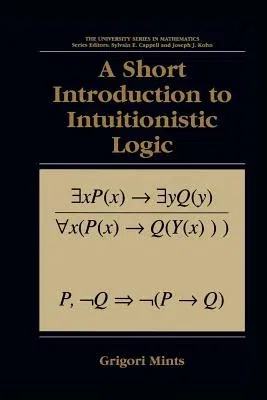Grigori Mints
(Author)A Short Introduction to Intuitionistic Logic (2000)Paperback - 2000, 26 April 2013

Qty
1
Turbo
Ships in 2 - 3 days
In Stock
Free Delivery
Cash on Delivery
15 Days
Free Returns
Secure Checkout
Part of Series
University Mathematics
Part of Series
University Series in Mathematics
Print Length
131 pages
Language
English
Publisher
Springer
Date Published
26 Apr 2013
ISBN-10
1475773196
ISBN-13
9781475773194
Description
Product Details
Author:
Book Edition:
2000
Book Format:
Paperback
Country of Origin:
NL
Date Published:
26 April 2013
Dimensions:
23.39 x
15.6 x
0.79 cm
ISBN-10:
1475773196
ISBN-13:
9781475773194
Language:
English
Location:
New York, NY
Pages:
131
Publisher:
Weight:
213.19 gm

